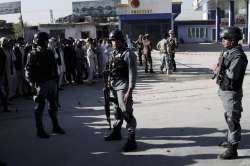Two Indians among 24 killed in Afghanistan; IS, Taliban claim stake
Kabul/New Delhi: Two Indians were among 14 people, providing security to the Canadian embassy here, killed when a suicide bomber targeted their mini bus in the Afghan capital on Monday, Indian and Afghan authorities said,

Kabul/New Delhi: Two Indians working as guards at the Canadian Embassy in Kabul were among 25 people killed in a string of Taliban suicide attacks across Afghanistan today.
In the first attack, a Taliban suicide bomber hit a minibus carrying foreign security guards in Kabul along the main road to the eastern city of Jalalabad, killing 14 people, inlcuding Indian and Nepalese security guards. Guards were providing security to the Canadian embassy here in Kabul.
Indian External Affairs Spokesperson Vikas Swarup said that the ministry learnt that two Indian nationals, Ganesh Thapa and Govind Singh from Dehradun died in the blast in Kabul. He tweeted that "government is in touch with the families of Indian nationals & is working with the Afghan Govt to repatriate their mortal remains at the earliest".
"The two Indians were working for a private security company Sabre International and probably deployed at the Canadian Embassy," he added.
The suicide bomber approached the bus in Banahi area along Pul-e-Charkhi road which is also called Jalalabad road at around 5.40 a.m., before detonating his explosives, the Afghan interior ministry statement said.
Five Nepalese and four Afghans were wounded in the attack.
The attacker too was killed on the spot and the blast also damaged several civilian vehicles and shops nearby.
Both the Islamic State terrorist group and the Taliban claimed responsibility for the bloodbath.
Zabiullah Mujahid, a purported Taliban spokesman, said over 20 people were killed or wounded in the attack. It said its "fighters" carried out the operation.
The killings drew swift condemnation in Afghanistan, Nepal, India and Pakistan.
President Mohammad Ashraf Ghani in a statement released by his office blamed the enemies of Afghanistan for the attacks, saying the terrorists by conducting subversive activities in the Muslim holy month of Ramadan want to terrorise the people.
In his message, the president also expressed sympathy with the families of the Nepalese and Afghan victims.
The Afghan government's Chief Executive Abdullah Abdullah said: "I condemn the terrorist attack on those travelling to their work places in Kabul. This attack is an act of terror and intimidation."
Indian Prime Minister Narendra Modi "strongly condemned the horrible tragedy" and offered "deep condolences" to the governments and people of Afghanistan and Nepal.
Nepal reacted with grief and shock.
Prime Minister K.P. Sharma Oli said: "I am shocked to hear that 14 Nepalis were killed... I express my heartfelt condolences to their kin."
He wished early recovery to those injured in the horrific incident.
Nepal has no embassy in Afghanistan. Its mission in Islamabad oversees the Afghan affairs.
The Nato-led Resolute Support Mission said: "The Taliban's actions repeatedly harm civilians in an effort to undermine the government..."
A similar bombing in a bazaar in Kasham district of the northern Badakhshan province at around 10 a.m. claimed the lives of 10 civilians and injured 40 others, according to provincial government spokesman Nawed Frotan.
A bomb blast injured five people including a member of the Kabul provincial council Attaullah Faizani on the same day.
Afghans from all walks of life have strongly condemned the three bombings in a single day as a cowardly act of terror, calling upon the militants to respect Ramadan.
Kabul resident Abdul Ghani said, "Ramadan is the month of peace and reconciliation and killing people in this month is against teaching of Islam".
Earlier on the eve of Ramadan, ulema or religious scholars had asked the Taliban to halt hostilities or at least observe a ceasefire during Ramadan.
However, the Taliban outfit described Ramadan as the month of Jihad or holy war and victory and vowed to intensify fighting in the month of Ramadan, a statement that has been widely condemned by Afghans
The Taliban-led insurgency has been rampant since early April when the group launched its annual offensive in different places, claiming hundreds of lives including militants, security personnel and civilians.
The Taliban has urged civilians to stay away from official gatherings, military convoys and centers regarded as legitimate targets by militants besides warning people not to support the government.
The Taliban has waged an insurgency since 2001. Nato ended its combat mission in December 2014 though some 13,000 training and counter-terrorism troops remain in Afghanistan.
Peace efforts have stalled after the Taliban refused to participate in new talks with Kabul until foreign forces leave the country.
(With inputs from agencies)